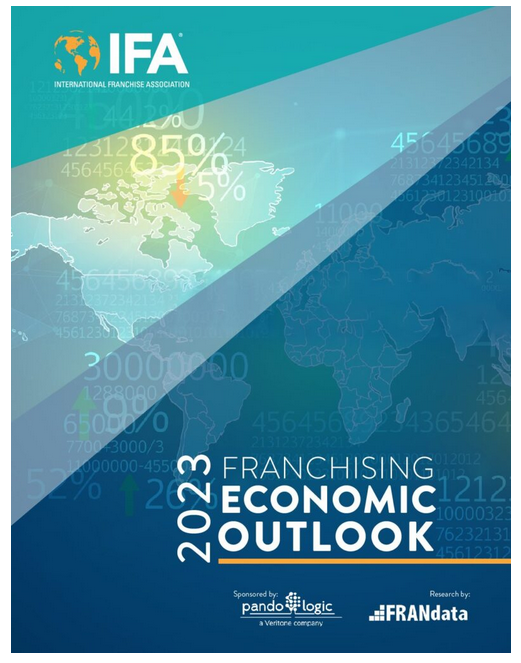
2023 IFA Franchise Economic Report
The International Franchise Association, in partnership with FRANdata, recently released its annual Franchising Economic Outlook Report. This 2023 report, which analyzes franchise performance over the previous year and forecasts the year ahead, predicts moderate growth for franchising this year. Despite current economic challenges over the last few years, franchising continues to grow, showing the power of the business model to help business owners navigate challenges ahead and continue driving economic growth.
In 2023, it is predicted that the number of franchise units will increase by 15,000 units, reaching 805,000 franchised businesses in the U.S. Franchising will add 254,000 jobs to the U.S. economy, employing approximately 8.7 million people in 2023, and generate $860.1 billion in economic output. Service-based industries and quick-service restaurants are expected to see the biggest growth among industries, with Texas, Illinois, and Florida as the top states for franchise growth.
Read more findings in the Franchise Economic report, including industry and state-by-state breakdowns here.
Read More

How to find the right buyer for your business
When it comes to selling your business, it seems like the person offering the highest price is the right buyer. However, there are other factors that should be considered. Finding the right buyer for your business means looking not only at offer price, but also at motives and potential problems.

Selling to a competitor can be a great option. The competitor already knows the business and how to market it. He will be familiar with potential clients, and your own employees may be able to stay on and continue in their current roles. However, if the deal falls through, you’ve just handed the competitor quite a bit of confidential information about your business.
A financial buyer can be a good option and most likely won’t be a competitor. Unfortunately, financial buyers are planning to sell your business again in a few years, for a profit. This means they’ll be unlikely to pay your asking price.
A strategic acquirer will be more likely to pay the price you’re asking, but you have to ask yourself what their motive is. It’s possible they’re buying the business just to close it or relocate it. That may mean that your employees will lose jobs or that the business will just no longer exist. This can be difficult for many business owners to accept.
Finally, consider an employee. Often a current employee is a great option for buying and taking over your business. Problems with this situation can occur though if the deal falls
through and others at your business learn the business is for sale. Potential issues might arise too if there are many employees who don’t get along with the one buying the business.
Using a business brokerage firm like Franchise Sellers is a great option because we can help you wade through the many offers for your business. If you’re wondering how to find the right buyer for your business, a broker can take the emotion out of it and find the best option for you and your situation.
If you’re looking to sell your franchise or want to buy a franchise resale, contact us today. Looking to buy or sell a small business that isn’t a franchise? Visit companysellers.com.
Read More
Buying a Distressed Business

It is safe to state that Howard Brownstein, President of The Brownstein Corporation, is a true expert in providing turnaround management and advisory services to companies, as well as their stakeholders. Brownstein serves as an independent corporate board member for both publicly held as well as privately-owned companies and nonprofits. During his career, he has been named a Board Leadership Fellow by the National Association of Corporate Directors (NACD) and served as Board Chair and President of its Philadelphia Chapter. He also serves as Vice Chair of the ABA Corporate Governance Committee and has been named a Fellow of the American Bar Foundation. He has been a speaker at many of the world’s top universities including Harvard Business School and Wharton. Brownstein received his J.D. and M.B.A. degrees from the University of Pennsylvania.
Mr. Brownstein is considered to be one of the world’s top experts in distressed businesses. He believes it is essential to remember that not all distressed businesses are, in fact, the same. There is simply no way to know how bad things are for a given distressed business until one begins to “look under the hood,” and get a full view of what problems may lurk underneath.
Brownstein firmly believes that distressed businesses can represent a real and often overlooked opportunity for buyers. The recent economic downturn brought about by COVID-19 means that there will likely be a great deal more distressed businesses on the market in the coming months or even in the next couple of years.
Why is a Given Business Distressed?
Before you consider purchasing a distressed business, you absolutely must understand the core reasons for the distresses. Without a proper and detailed understanding of why the business entered a state of distress in the first place, it is impossible to clearly articulate why the business will potentially be valuable in the future. It is essential to be able to convey “what went wrong” and how the problems can be fixed.
Brownstein points out that while there are many reasons for a business to enter distress, two symptoms top the list. The first is cash flow issues and the second issue relates to management. Often it turns out that the management was simply not rigorous enough. He also notes that companies will tend to gravitate to external issues as a way to explain away their failure.
Of course, no two distressed businesses are failing from 100% identical causes. Brownstein suggests a series of questions that you need to ask when you begin exploring a distressed business.
- What is the business’ potential value?
- Is there something of value under the problems?
- Under better or different circumstances, could the business be viable?
These are all questions that your business broker or M&A advisor can assist with. It’s important to gain a clear understanding of the business’ past, present and future.
Copyright: Business Brokerage Press, Inc.
The post Buying a Distressed Business appeared first on Deal Studio – Automate, accelerate and elevate your deal making.

How Should Your Company Deal with an Orphaned Product?

Keeping a product or service around that isn’t pulling its weight might prove to not be a very good idea. You may have invested a good deal of time and resources into its development, but if that product or service is no longer contributing to your bottom line, it might be time to cut it loose. Even if your product is pulling its weight, but doesn’t fit into your overall core business, then you should still consider getting rid of this “orphaned product.” Let’s take a look at some of the reasons you might want to keep or remove, an orphan product from your company.
There are four main reasons why a company might want to divest itself of a product line or service completely:
- An orphaned product line can be a distraction that takes away from core business operations.
- Funds allocated to an orphaned product could be used instead to build the core business or make improvements that are not in the current budget.
- Another good reason to remove an orphaned product from your lineup is that while it could ultimately be profitable with increased resources, the funds would be better allocated elsewhere.
- Your orphaned product could be profitable. Some buyers, companies and private equity groups are looking for product lines they can use to augment their existing ones. In fact, some buyers may even want to build a new business around a given product line.
Of course, it isn’t always as simple as “pulling the plug” and moving on. It is important to step back and consider the negative impacts of jettisoning an orphaned product, such as the fact that the product line could have key employees attached to it. Or there could be company culture issues related to removing the product, such as causing disruption within your company. You must also consider if the orphaned product could ultimately play a role in the sale of your company.
At the end of the day, an acquiring company may feel that the orphaned product line is a great fit for their existing distribution chain. Additionally, your offering might fit into a new product line that the acquiring company has launched. It is important that you evaluate every aspect of an orphaned product before making the decision to remove it from your company.
Understanding the needs and goals of your most likely buyers should play a role in your decision making. Working with an experienced business broker is an easy way to increase your chances of making the right decision.
Copyright: Business Brokerage Press, Inc.
The post How Should Your Company Deal with an Orphaned Product? appeared first on Deal Studio – Automate, accelerate and elevate your deal making.

5 Characteristics of a Successful Franchisee
Franchisors and researchers have spent many years profiling the ideal franchisee candidate to determine which type of buyer has the best chance for success. Franchisors and professional psychological profilers have spent large amounts of time and capital to increase their chances of gaining a successful franchisee. To understand how well a potential franchise candidate will do in a certain franchise system, the franchisor considers these five essential characteristics of successful franchisees. Here is what most successful franchisors look for in potential single-unit, multi-unit, and master franchise candidates before they will award the franchise:

People skills. The franchisee must have the ability and desire to deal well with people. If they treat their employees and customers with trust and respect they will probably treat the franchisor the same. If they treat their employees well the employees will usually treat the customers well. Franchisees will need to enjoy spending time with people. Franchisees who do not enjoy a lot of human interaction tend to become stressed. This will often lead to rudeness to employees, customers and eventually to their family, which will tear down the business instead of building it up.
Follow the System. The franchisee must have the ability and desire to follow a proven system. After analyzing the franchise system, the franchisee must be able to enjoy the system and reaping the rewards of following the proven track record. If the potential franchisee can’t or won’t follow a system for success, the franchisee should consider starting their own business or buying a business. At the heart of the franchise system are the marketing strategies and systems. The marketing programs should be examined carefully to insure the potential franchisee feels comfortable with the system.
Good Attitude. Carefully consider the potential franchisee’s attitude. Are they asking a lot of questions about failure or do they ask more questions about the success of the franchise. They should be seeking to find out what makes the franchise successful rather than dwelling on what makes the franchise a failure. All franchisors that have many units and that have been around a few years have failures. Most of the time it is due to the failure of the franchisee to follow the system. The franchisee must be self-motivated to take action and follow the successes of others. They should have a good work ethic and not be afraid to roll up their sleeves and work side-by-side with their employees. A potential franchisee can consider the success rate of the franchise. If it is under 70 to 80%, it may not be worth the time to consider it. Franchising as a whole has a 90% plus success rate.
Proper capitalization. The franchisee must have the minimum amount of liquid capital and net worth available to meet the franchisor’s requirements. A good franchisor will not allow the potential franchisee to move forward without the proper initial capital. The franchisee must have good credit, not perfect, but decent credit. This is essential for qualifying for a loan if necessary. Good credit also has a direct correlation with how successful the franchisee will become.Area development franchisees and master franchisees will need to have the four characteristics listed above and, in addition, a fifth characteristic listed as follows:
Extensive business experience. Real life success in real business is essential. Successful master franchisees or area development franchisees will take their experience and apply it to the franchise system to help other franchisees succeed. With a proven record of success of the potential franchisee, the franchisor can expect the success to continue on the franchise system.
Do you need help selling your franchise? Contact us.
Read More